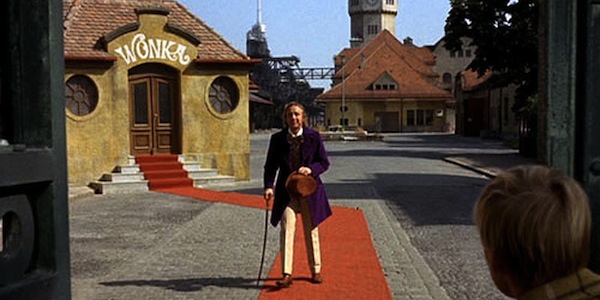Picture the scene. It's 2000 and I'm in a worldwide sales kickoff in Burlingame, California. We're in the swagger of the dotcom boom, and I'm working for a company that's riding that wave. On revenues of $100m we are "valued" with a market cap of over $40bn. And let's just say the founders have a spring in their step. One of them is pacing up and down the aisle in a conference room of 200 or so sales/marketing folk laying out his vision for the future. Hyperbole and "moon shot" thinking is heavy in the air and dramatically (I'm sure for effect) he has a walking stick, which adds a "Charlie & The Chocolate Factory Opening Scene" edge to the meet.
As well telling us that we'll all become millionaires (it never happened) he's also stressing that what we're doing is radically changing the world. Yes Sir! In fact, our grandchildren will thank us for what we've done and be in awe that we were at that company at that time. We would be renowned for improving the quality of global life. For freeing up capital. For helping companies to invest more in philanthropic causes. For making the poorer richer. And for making the sick healthier.
So, I hear you ask, what was this miracle company?
Was it a pharmaceutical business just weeks away from curing some of the world's most virulent diseases?
No.
What about a bio-medical company solving genetic disorders?
No.
Ok, so a charitable institute investing in infrastructure in underdeveloped countries?
No, again.
In reality I was working for Ariba, the now-part-of-SAP software company, that in 2000 was focussed on eProcurement and eMarketplace software to lower the cost of B2B buyer/seller transactions. Hmmm, doesn't exactly ring of worldwide salvation revered by future generation does it? Well, you see, our Founder's thinking was that if companies saved money, they would do better things with all that spare cash. Making the world a better place. QED.
Rrrriiiiiight. I think it fair to say that link is a wee bit tenuous, even in the Kool-Aid years of dot com tech.
Now whilst I can't say that digital marketing technology has solved world hunger, I do believe that it has the power to transform the (professional) lives of marketers. For me its radically changed my career, opened up new opportunities and improved my work life enormously. My particular epiphany (no pun intended) came when I was first introduced to marketing automation technology back in 2007 and implemented a Beta version of marketo to help me put some numbers, credibility and strategic importance back into my discussions with the business. It was the moment I realised B2B marketers like me could have a seat at the boardroom table again. And in the last 5-6 years, I can confidently say things have only got better. Its an incredibly exciting time to be a marketer, and I love what digital marketing technology has done to supercharge my career.
So, interested in a peer view on this, I decided to ask 11 marketing pros what their defining moment was re: digital marketing tech and how it changed their careers. I kept it open - letting them choose software, hardware or even companies they worked for.
I got some interesting answers, and here they are:
David Burnand, ex-Siemens, ATOS, now Marketing Director, Project One
“Salesforce.com way back in 2005! It was my first ever glimpse of directly measurable marketing without any middlemen. I remember receiving text messages (state-of-the-art back then!) via Salesforce every time we received a registration for an event we were running: it was like a whole new world!”
Ashley Friedlein, CEO & Co-Founder, eConsultancy
"CuteFTP (the FTP client). Suddenly no-one could stop me publishing to the world. Coming from TV, as I did, where you could have the best content in the world but to no avail if no-one broadcast it, it was intoxicating to have no 'gatekeeper' to a medium. AND people could communicate back. How liberating and empowering! It was then I switched to a career in digital."
Pete Jakob, ex-IBM now Owner, Purple Salix Limited
"Toodledo. I have always struggled with Todo lists, whether on paper or digital. What Toodledo did was to open my mind to a different way of thinking about personal productivity, and introduced me to the Getting Things Done approach to tackling work. Toodledo is just a tool (and not even particularly elegant), but it was the catalyst that lead me to a new approach to work that continues to serve me well every day, and is still my trusted system for capturing and managing tasks and ideas."
Brian Kardon, CMO, Lattice Engines
"Retargeting. It's great for keeping your brand in front of bounced traffic from your website. It's a cookie-based technology that uses a Javascript code to "follow" people all over the web. It's so effective because it's so focused -- on only people who have already come to your website and expressed interest."
Doug Kessler, Creative Director, Co-Founder, Velocity Partners Ltd
"Evernote. It changed my life as a content marketer. I can remember stuff I would have forgotten – stuff like blog post ideas, notes from meetings and the names of my children."
Todd Latham, ex-Microsoft, Amex, now VP Marketing, Currency Cloud
"Medallia, an enterprise SaaS survey tool. It enabled me to move away from massively expensive and cumbersome research agencies. I saved $300K a year but most importantly everyone in the business loved the realtime data and got actively involved in improving the customer experience. The result: NPS rocketed and attrition fell dramatically."
Lindsay Mahoney, ex-mfg.com, Silverpop, now Director of Integrated Marketing, Internap
"Marketing automation. It's changed the way we do business and has also made it so marketing can finally begin to show true attribution. We're no longer just doing activities and hoping that they work - we're actually able to make calculated decisions on what's work and what's not. As a marketer I carry a revenue target, to me, this wouldn't be possibly without marketing automation."
Will McInnes, CMO, Brandwatch
"The first tools that allowed me to search the social web blew my mind. Summize, searching (and later acquired by) Twitter. Boardreader, searching forums. I forget the names of the others.
I started to get a sense of this rich tapestry of conversation, this chaotic inherently human chatter. That blew my mind as a marketer. That we could really understand. That it was real. The Cluetrain Manifesto brought to life. Pretty mindblowing to me then. And now."
Ryan Skinner, Senior Analyst - Content Marketing, Forrester Research
"Typepad (cheap blogging software sibling to Wordpress). It powered my second blog (the first was an HTML self-built personal affair), called ShipCrunch, which I used as a platform for my rantings and ravings as a digital and social PR in an industry way behind the digital and social curve. Thanks to the Typepad-powered blog I made a jump closer to the front of the digital and social curve, first to Velocity Partners, then Forrester. Thanks, Typepad!"
Bryony Thomas, Founder, Watertight Marketing
"Twitter. As a sole trader it has kept me sane with friendly banter, kept me busy with excellent leads, and kept me updated with all the latest thinking."
Roger Warner, Director, Beyond
"The 'Network Computer' circa 1999, and the return of big servers. Showed me a radical alternative to ways of delivering/buying things. Fifteen years on, the Cloud exists. I'd say this is the single biggest catalyst for innovation in any given business sector over the past 20 years. I can now launch tomorrows billion dollar business on a rented infrastructure of $50 a month, from my bedroom (Google Apps, Amazon Web Services, etc). This was totally impossible when I started my working life. I started my first business in 2005, for peanuts and in one way or another, these services have been the focus for my work ever since - Facebook, blogs, etc... Some of them are even clients - which I love, working close to the source."
Interesting stuff. So... what's changed your digital marketing life? I would love to find out!









